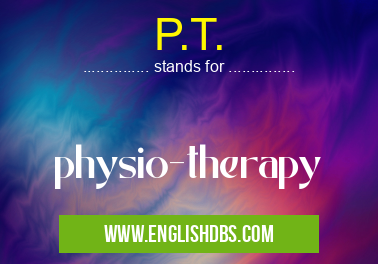What does P.T. mean in MEDICAL
P.T. is an abbreviation for the medical term “physio-therapy”, which refers to physical therapy or treatment used in medical care. Physio-therapy is a form of treatment that aims to improve physical health, muscle strength, and mobility by manipulating the body's natural movements and applying physical techniques to promote healing and recovery. Physio-therapy treatments are used to help patients recover from illness, injury, surgery, or other medical conditions.

P.T. meaning in Medical in Medical
P.T. mostly used in an acronym Medical in Category Medical that means physio-therapy
Shorthand: P.T.,
Full Form: physio-therapy
For more information of "physio-therapy", see the section below.
Purpose of P.T.
Physio-therapy can be used to treat a wide range of conditions and injuries, ranging from chronic pain and joint injuries to sports injuries and postoperative care. It can also help with rehabilitation after an accident or illness – helping the patient regain muscle strength and mobility. In addition to helping restore mobility and strength, physio-therapy can be used as part of a comprehensive wellness plan to help patients maintain or improve their overall health and wellbeing.
Types of P.T.
There are several different types of physiotherapy treatments that can be employed depending on the patient’s needs. Some common forms of physio-therapy include massage therapy, manual therapy (including manipulation of joints), ultrasound therapy (using sound waves to reduce swelling), electrical stimulation (to reduce pain or spasticity), hydrotherapy (water therapy) and exercise programs (such as stretching or strengthening exercises). Each type of physiotherapy has different benefits for various conditions and injuries; depending on the individual patient’s condition, a combination of therapies may be required for optimal results.
Essential Questions and Answers on physio-therapy in "MEDICAL»MEDICAL"
What is physio-therapy?
Physio-therapy is a form of physical treatment performed by a licensed physical therapist or physiotherapist. It incorporates exercises, stretches, massage, electrical stimulation and other techniques to rehabilitate the body and restore its normal function.
Who can benefit from physio-therapy?
Physio-therapy is beneficial for people suffering from musculoskeletal issues such as arthritis, sports injuries, back pain, neck pain, joint pain or any type of injury resulting in physical impairment. It can also help those with neurological conditions like stroke, multiple sclerosis and Parkinson’s disease.
How long does each physio-therapy session last?
Generally speaking, most physio-therapy sessions last between 30 minutes to an hour. Depending on the condition being treated and the extent of the injury/illness, it could be shorter or longer than this duration.
What types of exercises are done during physio-therapy?
During a physio-therapy session, your therapist will work with you to perform various exercises that target the affected area(s) of your body. These may include stretching exercises to build flexibility and strength; range of motion activities to increase joint mobility; balance activities; cardio activities including walking or running; and strengthening activities with weights and machines.
Is there any preparation required prior to my first physio-therapy appointment?
Yes. Before attending your first appointment it is recommended that you come prepared with information about your medical history (such as past illnesses/injuries), current condition/symptoms (if any), medications you are taking (if any) and details regarding any previous treatments received. It's important to wear comfortable clothing that allows full range of motion during your session too!
What should I expect during my first physio-therapy visit?
During your first visit with a physiotherapist you will likely go through an initial assessment. The purpose of this evaluation is for them to learn more about your condition so they can design an individualized treatment program tailored for you. The assessment includes discussing your medical history as well as performing some tests such as movement testing and muscle strength testing in order to assess the current state of your condition. At this time they may also provide advice or information on lifestyle modifications that could improve your situation over time
Final Words:
Physiotherapy is an important tool in medical care that helps patients improve their physical health and wellbeing by providing them with treatment plans tailored specifically for their needs. Physiotherapy treatments are used to help people recovering from illnesses or injuries regain muscle strength and restore mobility; while also being effective in treating chronic pain, sports injuries, postoperative care needs, and more.
